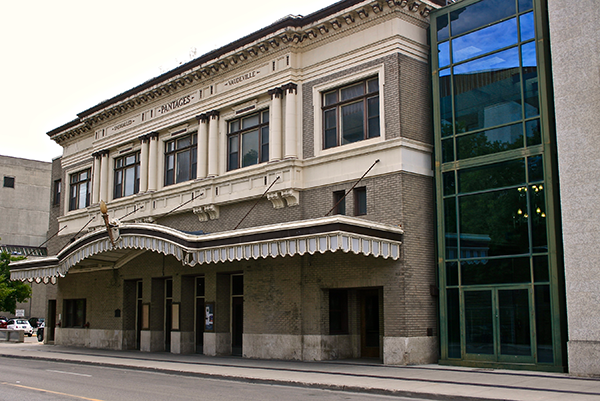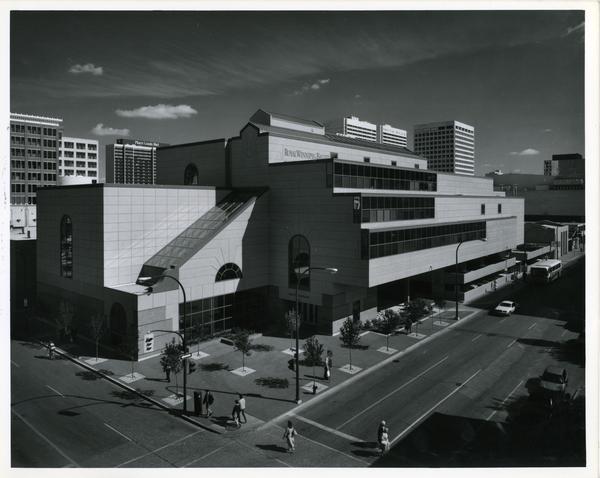Les Stechesen, a well-known and widely admired Winnipeg architect, was recently awarded the Winnipeg Architecture Foundation’s (WAF) first Legacy Award.
“Les has had a significant impact on the history and look of architecture in Winnipeg,” says Susan Algie, executive director of WAF. “We wanted to honour him while he is still with us.
“In addition to his modern designs, such as Executive House on Wellington Crescent and Grosvenor House on Grosvenor Avenue, he did a lot of work on the rehabilitation of historic buildings, such as the Courtyard Building in Osborne Village,” says Algie. “Les also designed some post-modern buildings, such as the Royal Winnipeg Ballet, the addition to the Pantages Theatre and some residences.”
Stechesen has had an extensive career, working independently and with a number of Winnipeg firms.
Born in northwestern Ontario, he graduated from the University of Manitoba with a bachelor of Architecture in 1957.
“I received my architectural education from Professor James Donahue,” says Stechesen. “He was a Modernist, and I emerged as one too.”
Modernism’s hey-day was early- to mid-20th century.

“While many artists, designers and architects looked to the past, and criticized mass production and manufacturing, Modernists capitalized on the availability of new materials, processes and engineering to change architecture,” Stechesen says.
Following graduation, Stechesen joined the Winnipeg firm of Libling Michener.
He designed some of the firm’s Massey Award winners, such as St. Paul’s High School, St. John Brebeuf Church and the Manitoba Teacher’s Society Building.
Stechesen also designed the (now demolished) Public Safety Building, a Brutalist structure that has both admirers and detractors.
In 1971 Stechesen was an architectural consultant for the Leaf Rapids Development Corporation to provide facilities for a new community in northern Manitoba.
Leaf Rapids Town Centre is a massive complex which acts as an entire downtown for the community.
The mall-like project, located in the centre of the town, contains an arena and curling rink, a school, library, health clinic, gym, cultural centre, hotel, restaurant and lounge, retail and grocery stores, a post office, bank and municipal offices.

For his design Stechesen won the Massey Award for Architecture in 1974.
After completing the Leaf Rapids project, Stechesen entered a partnership with George Frederickson and Alec Katz.
An early project for the firm was the redevelopment of 100 Osborne St., a 1909 brick apartment building near downtown.
The completed project, called The Courtyard, involved carving an internal courtyard to below grade, paving it with Mexican tiles and sandblasting the light interior brick.
The building won a Heritage ���ϳԹ��� Honour Award in 1977.
In 1985, the firm created a post-modern design for the downtown Window on Air ���ϳԹ��� Park.
On the plaza on Portage Avenue in front of the Air ���ϳԹ��� Building, marble columns support only air, and a pink pergola and a blue pool provide colour and vitality.
Stechesen describes it as “an effort to bring life back into architecture.”
Doug Hanna, a partner in Winnipeg’s Number TEN Architectural Group, says Stechesen’s designs are “always clever, creative and well crafted.”
“I think what makes his designs recognizable is the high level of design sophistication and the fact that his work evolved comfortably with the architectural styles of the day,” says Hanna. “He seemed to be able to go with ease from residential scale to large urban scale with the same level of design attention and craftsmanship.”
Winnipeg architectural historian Jeffrey Thorsteinson, who grew up near one of Stechesen’s favourite designs (St. John Brebeuf Church), says the architect’s buildings “are great to look at.”
“Les followed a variety of different styles and mixed them up,” says Thorsteinson. “Many architects don’t change, but he was cutting edge in different ways.”
Stechesen received the award on Nov. 9, two days before he turned 90.
The ceremony took place in the WAF space, a short walk from Portage and Main.
“It was informal and very Winnipeg,” says Algie. “There were about 65 people, very low-key and friendly. Some people brought baked goodies to munch on.”
A biographical presentation on Stechesen and his work was followed by tributes by Algie, Cindy Tugwell, executive director of Heritage Winnipeg and a fierce defender of Stechesen’s Public Safety Building, and landscape architect Heather Cram.
Stechesen has a few words of advice for young architects getting started.
“Be prepared for hard work and long hours,” he says. “Get to understand your city. Volunteer for committees both in your association and in your community.
“Keep up-to-date by attending lectures and seminars on new technologies and new styles. Keep your eyes and ears open and get involved in civic affairs. Good luck.”





Recent Comments
comments for this post are closed